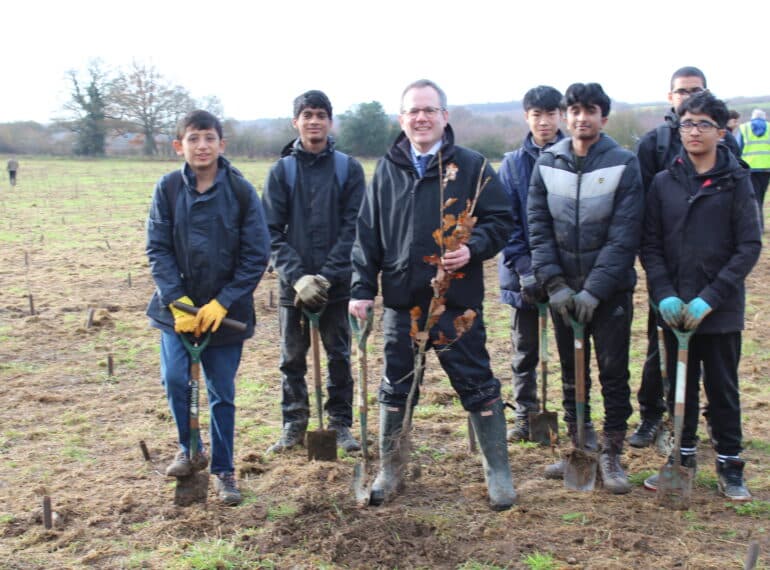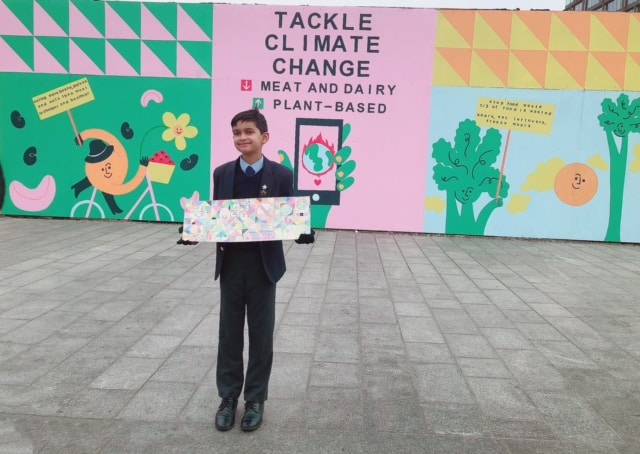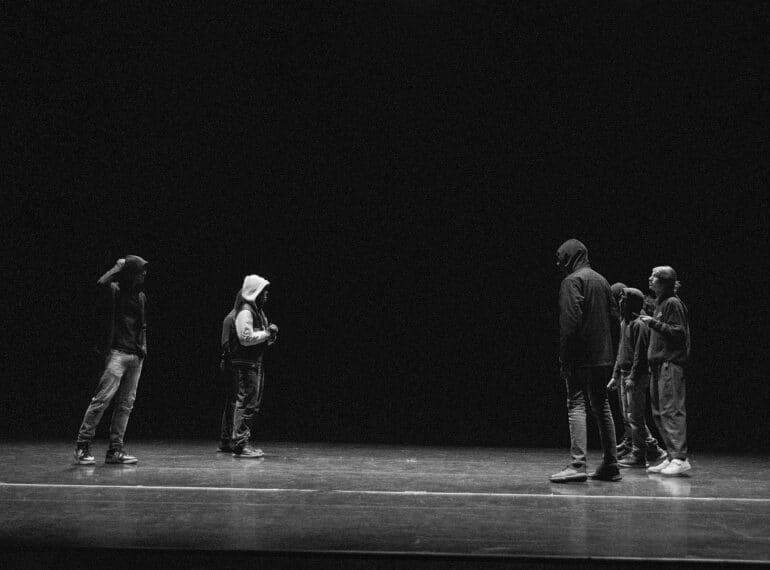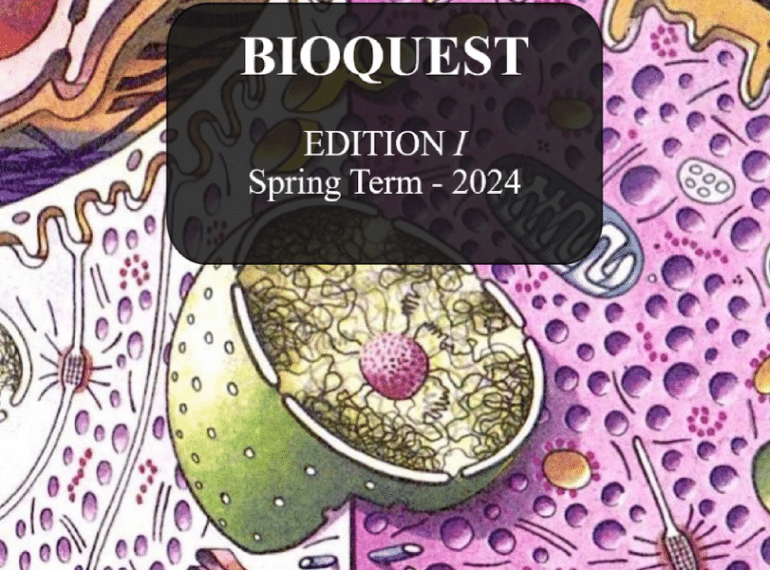
Bioquest, QE’s new, richly illustrated Science journal, features articles covering topics that range from a look at plant communication to an exploration of the eye’s importance in predicting human health.
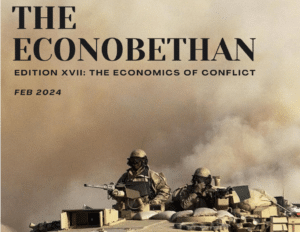 The first edition is contained within the pages of The Econobethan, the School’s well-established Economics and Politics magazine, but future editions are intended to be stand-alone publications.
The first edition is contained within the pages of The Econobethan, the School’s well-established Economics and Politics magazine, but future editions are intended to be stand-alone publications.
Edition XVII of The Econobethan takes as its theme The Economics of Conflict, looking at economic topics in theatres of war from Nazi Germany to the current conflicts in Ukraine and the Middle East.
Headmaster Neil Enright said: “My congratulations go to the team who have launched Bioquest – I hope it will be the first edition of many. It is also good to see such a high-quality edition of The Econobethan.
“Such publications provide excellent opportunities for boys to display genuine academic curiosity and scholarship. Through its thematic approach, The Econobethan demonstrates how the big issues cut across disciplines.
“It is important that our pupils develop an understanding of the world around them, and these publications show that they are taking great interest and thinking carefully about context.”
Bioquest is produced by a six-strong editorial team. One of them, Year 12’s Advik Balaji, appeals in his introduction for “dedicated scientists to contribute articles” for future editions.
Its six articles all feature colour illustrations and are all written by pupils in Year 12. They include Kavinayan Manivannan’s investigation of The Plants’ Trojan Horse, which explores plant cells’ use of RNA defence systems against necrotrophic fungi. Shivam Vyas looks at Microbiome Engineering in Plants, considering how a recent research breakthrough could “dramatically cut the use of pesticides and unlock opportunities to bolster plant health”.
 Seyed Jalili considers how the identification of CHIP (Clonal Hematopoiesis of Indeterminate Potential) in human blood cells might translate into effective treatments. Joshua John looks at the ethical implications of genetic screening in his piece entitled The Cost of a Human Life.
Seyed Jalili considers how the identification of CHIP (Clonal Hematopoiesis of Indeterminate Potential) in human blood cells might translate into effective treatments. Joshua John looks at the ethical implications of genetic screening in his piece entitled The Cost of a Human Life.
Within the Economics of Conflict-themed section of The Econobethan, the writers look both at particular wars and at economic lessons to be drawn from conflicts more generally. For example, Year 12’s Akheel Kale reflects on The Bizarre Nature of ‘Hitlernomics’ and Suryansh Sarangi, also of Year 12, explores the legacy of the British selling opium in China on the Chinese economy.
The magazine also includes a more general section on Economics, Politics and History.
- For those with access to the School’s eQE network, The Econobethan and Bioquest may be viewed here.

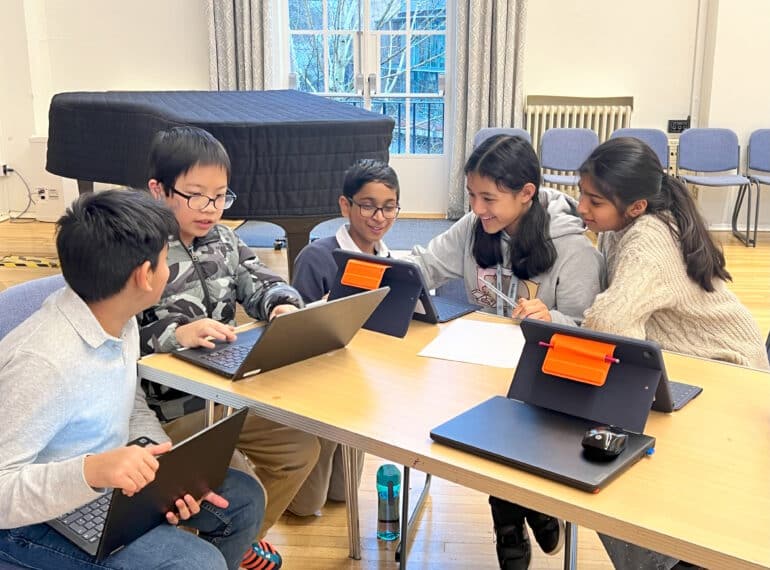
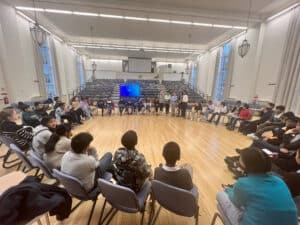 The QE contingent headed to North London Collegiate School for the Year 7 academic symposium, starting the day with a critical examination of social media posts representing different viewpoints and highlighting different scientific data on the atmosphere.
The QE contingent headed to North London Collegiate School for the Year 7 academic symposium, starting the day with a critical examination of social media posts representing different viewpoints and highlighting different scientific data on the atmosphere.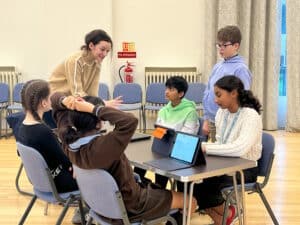 Next, they looked at the impact of different techniques employed in speeches, including the influential contributions made by Thunberg, who customarily challenges world leaders to take immediate action over climate change.
Next, they looked at the impact of different techniques employed in speeches, including the influential contributions made by Thunberg, who customarily challenges world leaders to take immediate action over climate change.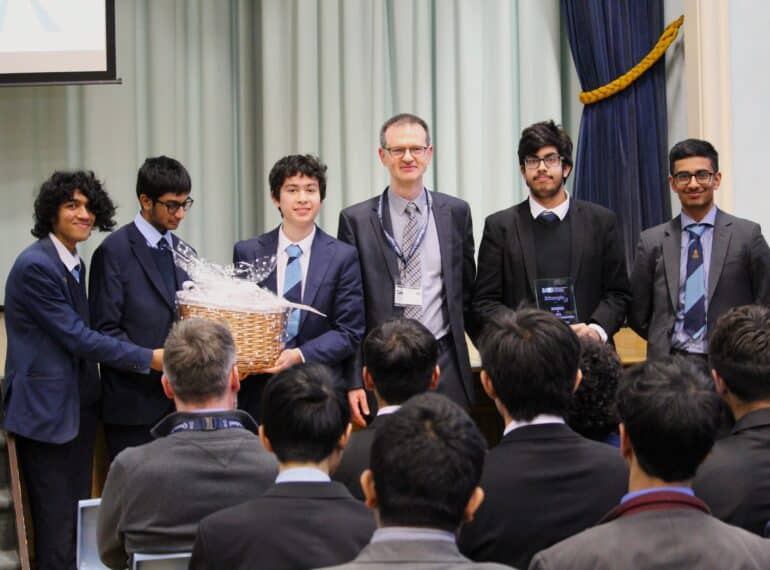
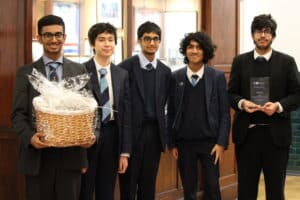 The five-strong team submitted the best answer to the final question, thus winning them the title in the competition run by education charity MEI (Mathematics, Education, Innovation).
The five-strong team submitted the best answer to the final question, thus winning them the title in the competition run by education charity MEI (Mathematics, Education, Innovation).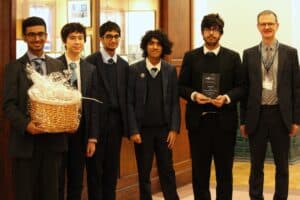 Mathematics teacher and Head of Academic Administration Wendy Fung said: “It essentially involved finding the smallest possible number that met a set of criteria. The question setters came up with an answer of 56, which they expected to be beaten by someone, but not by a great deal.
Mathematics teacher and Head of Academic Administration Wendy Fung said: “It essentially involved finding the smallest possible number that met a set of criteria. The question setters came up with an answer of 56, which they expected to be beaten by someone, but not by a great deal.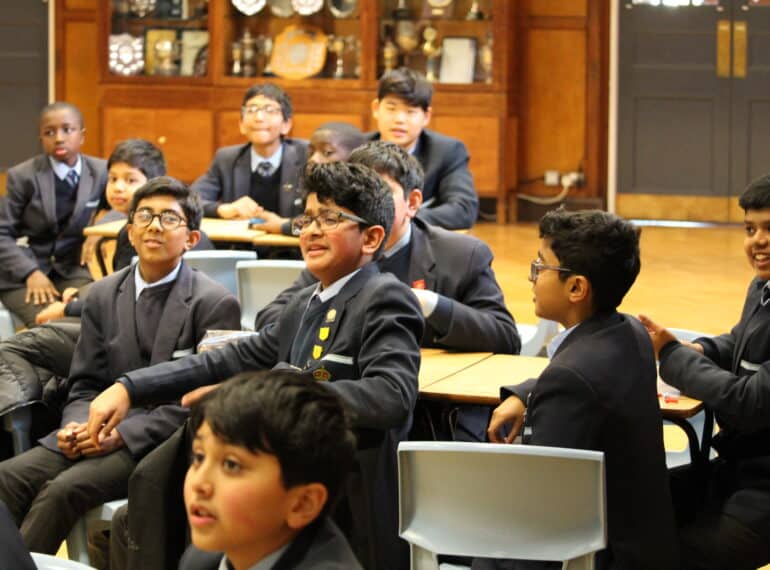
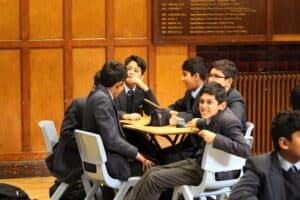 Ibrahim Syed and Azaan Haque promoted the lunchtime quiz to Year 7 and 8, who turned out in numbers to answer the questions, raising money for Greenpeace in the process.
Ibrahim Syed and Azaan Haque promoted the lunchtime quiz to Year 7 and 8, who turned out in numbers to answer the questions, raising money for Greenpeace in the process.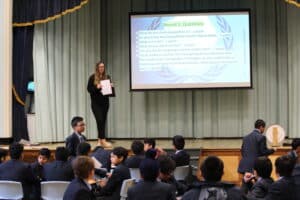 Ibrahim and Azaan were assisted by QE Flourish tutor Eleanor Barrett, who is also a Geography teacher.
Ibrahim and Azaan were assisted by QE Flourish tutor Eleanor Barrett, who is also a Geography teacher.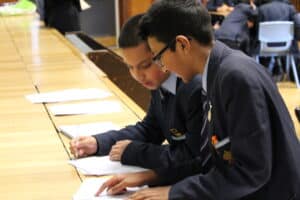 Among the attendees was Priyankan Ampalavanar, of Year 8, who said: “The geopolitics quiz was not only a very riveting experience, but it also broadened my mind to how aspects of geopolitics are intertwined with our daily lives.”
Among the attendees was Priyankan Ampalavanar, of Year 8, who said: “The geopolitics quiz was not only a very riveting experience, but it also broadened my mind to how aspects of geopolitics are intertwined with our daily lives.”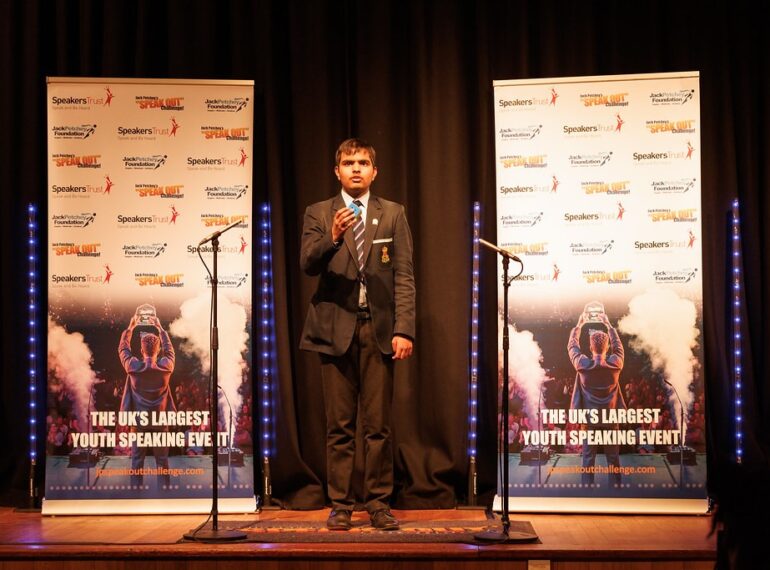
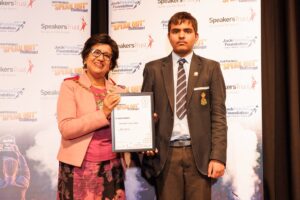 Mohith won his place in the Barnet final of the Jack Petchey Speak Out Challenge by delivering a speech at QE about his determination to up his performance with the Rubik’s cube – all the while actually solving a Rubik’s cube as he spoke.
Mohith won his place in the Barnet final of the Jack Petchey Speak Out Challenge by delivering a speech at QE about his determination to up his performance with the Rubik’s cube – all the while actually solving a Rubik’s cube as he spoke.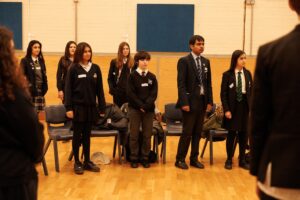 Billed as the UK’s largest youth-speaking event, the Jack Petchey Speak Out Challenge is a programme managed and delivered by Speakers Trust, the UK’s leading public-speaking organisation. It is supported and funded by the Jack Petchey Foundation. Sir Jack Petchey, who is 98 years old, is a businessman and philanthropist who made his fortune in property and timeshare.
Billed as the UK’s largest youth-speaking event, the Jack Petchey Speak Out Challenge is a programme managed and delivered by Speakers Trust, the UK’s leading public-speaking organisation. It is supported and funded by the Jack Petchey Foundation. Sir Jack Petchey, who is 98 years old, is a businessman and philanthropist who made his fortune in property and timeshare.
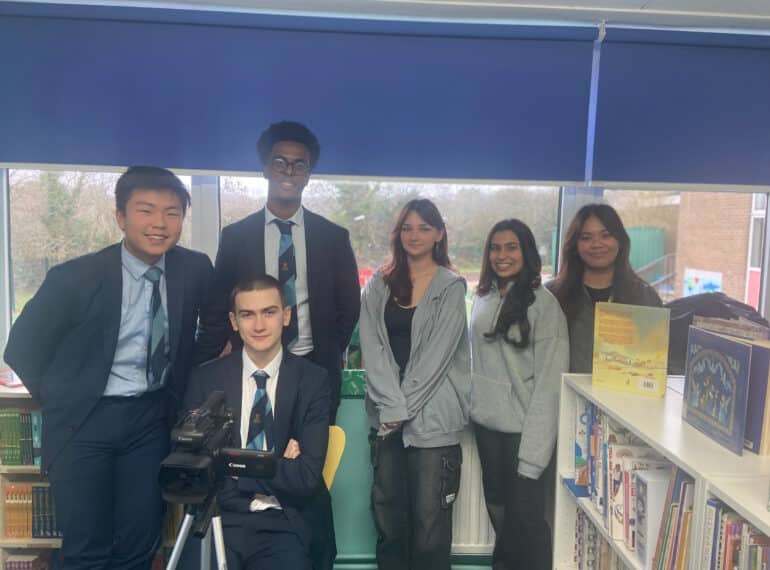
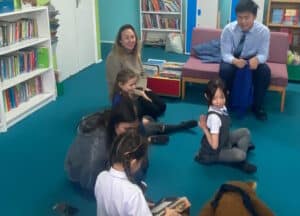 A team from the partnership – consisting of senior pupils from QE and Queen Elizabeth’s Girls’ School – visited QE’s near-neighbour, Christ Church Primary School. The filming was the latest stage in a project that the team have been working on for several months to create a promotional video aimed at encouraging prospective parents to sign up for Christ Church’s nursery.
A team from the partnership – consisting of senior pupils from QE and Queen Elizabeth’s Girls’ School – visited QE’s near-neighbour, Christ Church Primary School. The filming was the latest stage in a project that the team have been working on for several months to create a promotional video aimed at encouraging prospective parents to sign up for Christ Church’s nursery.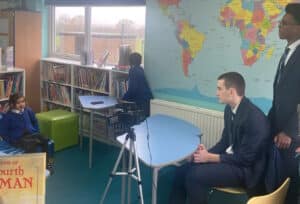 “We engaged with children, including those as young as nursery, guiding them to express the school motto [‘Through God’s love, we learn, aspire and achieve; we flourish’] and ethos. This collaborative effort not only enriched the visual narrative, but also provided an authentic perspective on the school’s values and identity.
“We engaged with children, including those as young as nursery, guiding them to express the school motto [‘Through God’s love, we learn, aspire and achieve; we flourish’] and ethos. This collaborative effort not only enriched the visual narrative, but also provided an authentic perspective on the school’s values and identity.